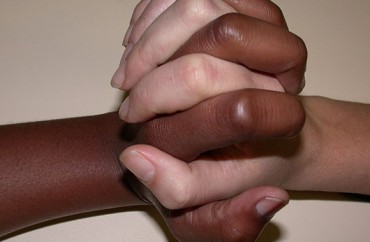
Over two years ago I asked if colorblindness, or not having an obsession with people’s race, was a bad thing.
The short answer is no, it’s not. However, consider how race-obsessed educationists have upped the ante since, especially last summer.
Ironically, one of the things the race-obsessed point out is that race is a social construct — it was created to enforce white dominance. Yet they want to maintain this dubious creation … but now for their own nefarious purposes.
University of Vermont Psychology Professor Jamie Abaied is the latest to jump on this bandwagon, claiming that (white) parents who preach colorblindness are a “big problem.”
In the journal Cultural Diversity and Ethnic Minority Psychology, Abaied and her colleagues surveyed 165 white parents of kids aged 8-12 regarding what they talk about race-related.
“More than half of white parents expressed at least one form of what the researchers call ‘broad colorblind socialization,’” HuffPost reports. “Essentially, they downplayed the importance or reality of race in our society.”
In another question, more than 60 percent said they “hadn’t talked to their children about race-related current events at all” noting a need to “shield” their kid(s) from “adult” issues.
MORE: Who’d’ve thought? White students sometimes ‘resist’ lessons on racism
Well, yeah. We’re talking about 8 to 12 year olds, the oldest in that range barely in middle school. But this doesn’t deter Abaied, who tweeted last month:
White parents, when you talk about the Chauvin verdict with your children, help them understand the context. Tell them how unusual it is for cops to be held accountable for taking Black lives. Tell them why that is unacceptable. And make it clear that our work is far from done.
— Jamie Abaied (@jabaied) April 20, 2021
Despite it being quite predictable the direction from which Abaied would lead her conversations, I’m guessing many would shrink at explaining to an 8-year old the subtleties of police interactions, race and racism: “Qualified immuni-WHAT, mom? Can’t I just go out and play a little pick-up football with the guys?”
To her credit, Abaied says “there’s a subtle distinction between saying ‘race doesn’t matter’ and ‘race shouldn’t matter.’” Most people would agree the latter phrase is more apt, but that’s where the “race hopeful” butt heads with the race obsessed.
As The Weekly Standard’s David Marcus said,
This gets to the not-especially nuanced opposition to the colorblind model on the Left. At its silliest it imagines white people pretending that they literally do not see the color of a person’s skin, like George Costanza, in search of a black friend, claiming he doesn’t “really see people in terms of color.” But “color blind” doesn’t mean that you don’t see skin color. It means that you try not to make irrational judgements based on skin color.
Marcus also notes folks can agree that “white privilege” is a real thing, but solutions to it and the degree to which it remains a problem are where people differ.
I believe colorblindness is a worthy goal because my father, who got married (and had me) during the 1960s civil rights era, believed in Martin Luther King Jr.’s dream. He taught me white privilege was a thing; in the late 70s, the only black boy in our little league was on my team. Dad told me to be vigilant for any abuse which might come his way, and to have his back if it did (and some did). After all, a black kid in ‘burbs at that time wasn’t exactly common.
A decade later during our first in-depth visit to Washington DC to see the sights, we stopped by the National Archives. At the site of the original U.S. Constitution, there were two guards on either side of it, one white and one black. While in line, my dad tapped me and whispered: “That black guard caught me a few minutes ago and said ‘Hey buddy — see this old piece of paper [the Constitution]? It really doesn’t apply to me.'”
Dad wasn’t serious, of course, but his point was well taken. Nevertheless, dad is vigorously opposed to the tactics of the race obsessed and critical race theorists because they’re pushing the races further apart instead of unifying them.
Race should not matter … and that’s why we can’t give up on achieving a colorblind society.
MORE: Why Robin DiAngelo’s ‘White Fragility’ is dangerous






Please join the conversation about our stories on Facebook, Twitter, Instagram, Reddit, MeWe, Rumble, Gab, Minds and Gettr.